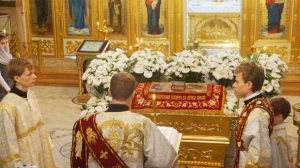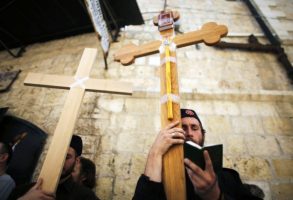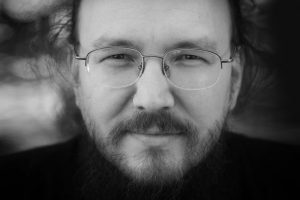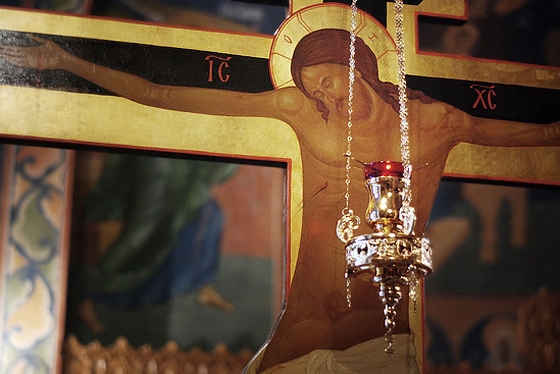 Great Lent is over and Holy Week, the most important days of the church year, has begun. Pravmir asked four respected clergymen in Russia – Fr. Valerian Krechetov, Fr. Vladimir Shaforostov, Fr. Maxim Pervozvansky, and Fr. Kirill Kaleda – for advice on how best to spend these days.
Great Lent is over and Holy Week, the most important days of the church year, has begun. Pravmir asked four respected clergymen in Russia – Fr. Valerian Krechetov, Fr. Vladimir Shaforostov, Fr. Maxim Pervozvansky, and Fr. Kirill Kaleda – for advice on how best to spend these days.
Archpriest Valerian Krechetov
 The time of the fast, which was given to man to achieve repentance, ends on Friday of the sixth week. The entire meaning of the struggle of repentance accomplished during Great Lent lies, as the Holy Fathers say, in purifying the heart.
The time of the fast, which was given to man to achieve repentance, ends on Friday of the sixth week. The entire meaning of the struggle of repentance accomplished during Great Lent lies, as the Holy Fathers say, in purifying the heart.
Both John the Forerunner and the Lord Himself began their preaching with the words: Repent: for the kingdom of heaven is at hand [cf., Matthew 3:2; 4:17]. And when, as it says in the Canon of Andrew of Crete, “the prophets have already lost their power” [cf., Ode 9 for Monday], the Church prepares the feast of Christ’s Resurrection, showing the last days of His life, when the Lord suffered for our sins. As God, He knew about everything that would take place, but as man He asked for compassion: Then saith He unto them, My soul is exceeding sorrowful, even unto death: tarry ye here, and watch with Me (Matthew 26:38).
Holy Week prepares us for the feast of Pascha, showing us that there is no other path towards resurrection than through the cross and suffering. Therefore the common people said: “The Lord endured, and bid us do the same.” [1]
The divine services of Holy Week call on one to have compassion and sympathy for the Savior.
On the first three days one is supposed to reread all four Gospels as a reminder that the Lord created us, but that we crucified Him by our sins. And although this appears to be addressed to the Jews of that time, it relates to everyone who has crucified Christ by his sins.
During Holy Week it is desirable, if one has the opportunity, to be in church more often, especially on Holy Thursday and the evening before. On the morning of Great Thursday the faithful participate in the Mystical Supper and receive Holy Communion, while in the evening the Passion Gospels are read. Then comes Great Friday: the Savior’s crucifixion and burial, with the beginning of the joy of Bright Saturday.
The angels were the first to learn of Christ’s Resurrection, just as they were the first to learn of His Nativity. Therefore the Church sings: “Thy Resurrection, O Christ Savior, the angels hymn in the heavens; vouchsafe also us on earth with pure hearts to glorify Thee.” Why does it say “with pure hearts”? Because it is reckoned that, in preparation for this radiant day, one has cleansed one’s heart by fasting as much as possible.
Fr. Valerian Krechetov is Rector of the Protection Church in Akulovo (Odintsovsky district, Moscow region) and the spiritual father of the Moscow Diocese.
Archpriest Vladimir Shaforostov
 Holy Week is a special time. One should not live through these days in a relaxed manner, as if Christ were not crucified for our salvation.
Holy Week is a special time. One should not live through these days in a relaxed manner, as if Christ were not crucified for our salvation.
Unfortunately, many strive to get everything out of life, but forget about the main thing. Rejecting Christ and not responding to Divine love, people deprive themselves of grace-filled joy and the meaning of life. Allow me to remind Pravmir’s readers of Pascal’s so-called wager: one who believes in Christ wins eternal life if he is right, but loses nothing if he is wrong; an unbeliever wins nothing if he is right, but loses eternal life is he is mistaken.
St. John Chrysostom righted noted: “God is grieved not so much by the sins that we have committed, than by our unwillingness to amend ourselves.”
During Holy Week, everyone who wants to be a faithful disciple of Christ should do everything possible to renounce sinful desires and to place prayerful communion with God above all else.
One should not demand love for oneself or cause pain to one’s neighbor. It is better to endure patiently for the sake of Christ and to strive to live through these great days in such a way that our lives be made up of genuine service to God and neighbor.
It is important not just to “stand through” the services and recall the Savior’s suffering, but prayerfully to co-suffer and be co-crucified with Christ. May God grant us all the strength to preserve and multiply all the light given to us by grace and to overcome the sin that separates us from Christ the Savior!
Fr. Vladimir Shaforostov is Rector of the Church of the Sign in Krasnogorsk.
Archpriest Maxim Pervozvansky
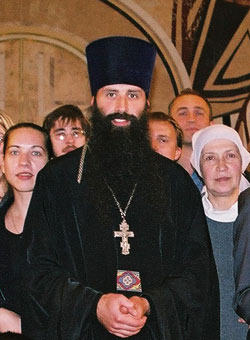 Inasmuch as Holy Week is the culmination of the entire church year, and the period during which all the events that took place in the last days of our Lord Jesus Christ’s life are remembered, I would advise spending as much time in church as possible.
Inasmuch as Holy Week is the culmination of the entire church year, and the period during which all the events that took place in the last days of our Lord Jesus Christ’s life are remembered, I would advise spending as much time in church as possible.
All the Holy Week services are arranged in such a way that we not miss any of them.
Normally on Sunday evening the Matins for Monday is served, with the hymn “Behold, the Bridegroom cometh at midnight” and the reading of the Gospel.
Matins of the following day is dedicated to the Lord’s sojourn in Jerusalem in the period between his Entry into Jerusalem and His sufferings.
Wednesday evening and Thursday morning the services of Great Thursday are celebrated.
Thursday evening is the Matins for Holy Friday with the reading of the Passion Gospels.
On Friday there are three divine services in churches: the Royal Hours, Vespers with the bringing out of the burial shroud, and Matins with the Lamentations.
Then, of course, there is the Divine Liturgy and the services of Great Saturday.
Therefore my primary advice is to attend as many services as possible and to receive Holy Communion at least on Great Thursday and on Pascha.
Fr. Maxim Pervozvansky is a clergyman of the Church of the Forty Martyrs of Sebastia in Spassky Sloboda (Moscow), chief editor of the Orthodox youth magazine “Naslednik,” and spiritual father of the “Young Russia” youth organization.
Archpriest Kirill Kaleda
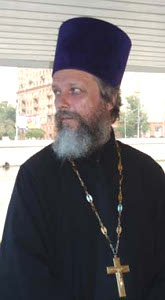 One needs to prepare for Holy Week. The preparation for Holy Week is Great Lent.
One needs to prepare for Holy Week. The preparation for Holy Week is Great Lent.
It is likely impossible to experience Holy Week without this preparation. Each day of the week is dedicated to experiencing events that took place almost 2,000 years ago. Therefore it is essential to read the Gospel daily in order to experience these events along with the Church.
Prayer is essential, of course, because we are not simply remembering certain historical events, but participating in them prayerfully. Therefore it is impossible to spend Holy Week without prayer – especially prayer in church, because it is here that we especially experience these days that are so important for our salvation.
If it is not possible to attend services during this week, then it is essential to read the Gospel daily. We can read the Gospel at home, on public transportation, and at our jobs, if it does not interfere with our work.
Fr. Kirill Kaleda is Rector of the Church of the New Martyrs and Confessors of Russia in Butovo.
Translator’s note:
[1] Semi-rhyming proverb: Gospod’ terpel i nam velel.












